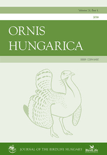
ORNIS HUNGARICA
metrics 2024
Advancing avian knowledge for a sustainable future.
Introduction
ORNIS HUNGARICA, an esteemed journal in the fields of Animal Science and Zoology as well as Ecology, Evolution, Behavior and Systematics, is published by Walter de Gruyter GmbH, a leading scientific publisher renowned for its commitment to disseminating high-quality research. Operating under an Open Access model since 2012, this journal provides invaluable access to scholarly articles, fostering collaboration and knowledge sharing among researchers and professionals. With its ISSN 1215-1610 and E-ISSN 2061-9588, ORNIS HUNGARICA has become a noteworthy platform for innovative studies and findings from Hungary and beyond, contributing significantly to the discourse in its field. As indicated by its Q3 ranking in Animal Science and Zoology and Q4 ranking in Ecology, the journal is recognized for its diverse research contributions, although it aims to expand its reach and relevance in future editions. Researchers and students alike will find in ORNIS HUNGARICA a dedicated resource for advancing knowledge and furthering the understanding of avian biology and ecology.
Metrics 2024
 0.24
0.24 0.40
0.40 -
- 12
12Metrics History
Rank 2024
Scopus
IF (Web Of Science)
JCI (Web Of Science)
Quartile History
Similar Journals

GAYANA
Pioneering insights into our aquatic and terrestrial ecosystems.GAYANA is a pioneering journal in the fields of Animal Science and Zoology and Aquatic Science, published by EDICIONES UNIV, CONCEPCION in Chile. With an ISSN of 0717-652X and an E-ISSN of 0717-6538, this journal has been at the forefront of research dissemination since its inception in 2006. Recognized in 2023 with a Q4 quartile ranking in both its categories, GAYANA provides a platform for researchers and practitioners alike to explore and publish their findings. Despite its relatively new establishment, the journal has carved a niche in aquatic and animal research, as evidenced by its Scopus ranks in the 12th and 7th percentiles, respectively. With challenges in access options, GAYANA emphasizes the significance of open scholarly communication, fostering an academic environment where knowledge is shared and advanced. Contributing to GAYANA means being part of a growing community dedicated to understanding and conserving our natural world.

RUSSIAN JOURNAL OF THERIOLOGY
Bridging Disciplines in Zoology and Plant ScienceRUSSIAN JOURNAL OF THERIOLOGY is a prominent academic journal published by KMK SCIENTIFIC PRESS LTD in collaboration with the esteemed Moscow State University. As a dedicated platform for researchers in the fields of Animal Science and Zoology, Ecology, Evolution, Behavior and Systematics, and Plant Science, this journal strives to advance our understanding of terrestrial ecosystems and their inhabitants. Although it currently holds a Q4 ranking and ranks within the lower percentiles of its respective categories, the journal's consistent publishing output since 2011 showcases a commitment to facilitating scientific discourse and collaboration. Addressed to a diverse audience of researchers, professionals, and students, RUSSIAN JOURNAL OF THERIOLOGY serves as an essential resource for disseminating valuable insights and fostering future advancements in the biological sciences.
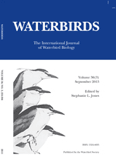
WATERBIRDS
Bridging Science and Conservation in Waterbird ResearchWATERBIRDS, published by the WATERBIRD SOC, serves as a vital scholarly resource in the field of Animal Science and Zoology. With its ISSN 1524-4695 and E-ISSN 1938-5390, this journal has established a significant presence since its inception in 1996, continuing to contribute valuable insights and research up to 2024. Recognized for its impact within the academic community, WATERBIRDS is currently positioned in the third quartile (Q3) for its category in 2023, ranking 335 out of 490 in Scopus's Agricultural and Biological Sciences sector, which underscores its role in promoting the study of avian species and their habitats. The journal is accessible to a wider audience, aligning with the growing demand for open access to scientific knowledge. By disseminating research that addresses both ecological and conservation issues pertinent to waterbirds, this publication serves as an essential platform for researchers, professionals, and students dedicated to advancing the understanding of avian biology and related fields.
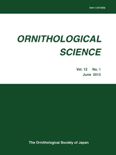
ORNITHOLOGICAL SCIENCE
Unveiling the secrets of avian biology and behavior.ORNITHOLOGICAL SCIENCE, published by the Ornithological Society of Japan in collaboration with the University of Tokyo, stands as a pivotal platform for advancing knowledge in the field of ornithology. With a keen focus on avian biology and conservation, this esteemed journal is dedicated to publishing high-quality research, reviews, and technical notes that explore the intricacies of bird science. Although currently categorized within the Q4 quartile in Animal Science and Zoology, the journal aims to elevate its standings by fostering scholarly communication and impactful scientific discourse. This journal has been consistently publishing since its inception in 2002, with a brief hiatus before resuming its invaluable contributions to the scientific community in 2009. Despite the absence of specific open access options, the journal remains a crucial resource for researchers, professionals, and students seeking to expand their understanding of avian ecology and behavior. Through its comprehensive scope, ORNITHOLOGICAL SCIENCE reflects the increasing importance of ornithological studies in addressing global biodiversity issues and conservation challenges.

North-Western Journal of Zoology
Championing Scholarly Dialogue in ZoologyNorth-Western Journal of Zoology is a prominent scholarly publication dedicated to the field of zoology, fostering a vibrant exchange of research findings and insights among scientists, professionals, and students. Published by UNIV ORADEA PUBL HOUSE in Romania, this journal has been a reliable source for advancing knowledge in Animal Science and Zoology since its inception in 2008, with its publications spanning until 2024. With an engaging focus on innovative research and review articles, the journal proudly holds a Q3 quartile ranking in its category for 2023, positioning itself within the competitive landscape of Scopus Ranks. Although currently lacking an open-access model, the journal provides a valuable platform for disseminating critical findings essential to understanding animal biology and ecology. Researchers contributing to this journal benefit from a dedicated readership, furthering the discussion and practical applications of their work in diverse contexts.
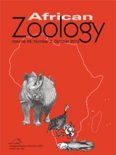
AFRICAN ZOOLOGY
Bridging Science and Conservation in AfricaAFRICAN ZOOLOGY, published by Taylor & Francis Ltd, stands as a significant journal in the realm of Animal Science and Zoology, with a proud history dating back to 1996 and slated to continue until 2024. With an ISSN of 1562-7020 and E-ISSN 2224-073X, this journal provides a reputable platform for researchers and practitioners dedicated to the study of animal biology across the African continent. It has been recognized for its quality scholarship, evidenced by its Q3 categorization in the 2023 Scopus quartile rankings and an impressive rank of #182 out of 490 within its field. As an open-access journal, it facilitates the dissemination of vital research findings and promotes broader accessibility, catering to a diverse audience of professionals, scholars, and students alike. The journal aims to enhance our understanding of wildlife, conservation, and ecosystem dynamics in Africa, fostering collaborations that address critical ecological challenges. For researchers and enthusiasts keen on contributing to and staying informed about advancements in zoological science, AFRICAN ZOOLOGY is an essential resource that enriches the global discourse on biodiversity and conservation efforts.
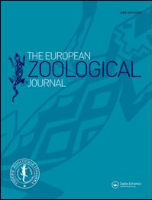
European Zoological Journal
Exploring the Wonders of ZoologyEuropean Zoological Journal, published by Taylor & Francis Ltd, is an esteemed open-access publication dedicated to advancing the exciting field of zoology. Since its inception in 2017, this journal has progressively established itself as a vital resource for researchers, professionals, and students alike. With its Q2 ranking in Animal Science and Zoology as of 2023, the journal ranks in the 69th percentile among its peers, showcasing its influence and contribution to the discipline. The journal’s broad scope covers a wide range of topics within zoology, aiming to foster an understanding of animal biology and conservation efforts. As an open-access journal, it not only enhances the dissemination of knowledge but also encourages collaborative research across global communities. Situated in the United Kingdom, the European Zoological Journal invites submissions that contribute to the evolving discourse in animal sciences, and endeavors to support the scientific community in addressing pressing ecological challenges.

Vertebrate Zoology
Championing Open Access in Zoological StudiesVertebrate Zoology is a prestigious open-access journal published by the Staatliches Museum Tierkunde Dresden in Germany, focusing on the intricate and diverse field of animal biology. With an ISSN of 1864-5755, the journal has established itself as a vital resource for researchers, professionals, and students in the realms of Animal Science and Ecology, Evolution, Behavior, and Systematics. Since transitioning to open access in 2021, it has expanded accessibility and global dissemination of research findings, showcasing significant studies that contribute to our understanding of vertebrate fauna. The journal's impressive Q1 quartile rankings in both Animal Science and Zoology, as well as Ecology and Evolution, underscore its influence within the academic community—ranking #95 and #220 in their respective categories according to Scopus. Spanning from 2011 to 2024, Vertebrate Zoology aims to provide a comprehensive platform for innovative research, fostering collaboration and advancing knowledge across the biological sciences.

MARINE ORNITHOLOGY
Unveiling the Wonders of Seabirds and Their HabitatsMarine Ornithology, published by the Pacific Seabird Group, is a vital resource in the field of animal science, zoology, and oceanography. With an ISSN of 1018-3337 and E-ISSN of 2074-1235, this journal has been a cornerstone for researchers and enthusiasts since its inception, actively contributing to the understanding of marine bird species and their ecosystems. Although it is currently not an open-access journal, it provides critical insights and findings that inform both academic research and practical conservation efforts. With its category quartiles positioned in Q3 for both Animal Science and Zoology, and Oceanography, Marine Ornithology occupies a significant, albeit competitive niche among scholarly publications. Researchers can benefit from its comprehensive coverage of marine avian studies, which is crucial for addressing the challenges these species face in changing oceanic environments. As the journal continues to evolve, with coverage from 1990 to 2024, it maintains an essential role in enriching our knowledge of marine biodiversity.

RAFFLES BULLETIN OF ZOOLOGY
Bridging Knowledge Gaps in Zoology and EcologyRaffles Bulletin of Zoology, published by the National University of Singapore's Lee Kong Chian Natural History Museum, serves as a prestigious platform for the dissemination of cutting-edge research in Animal Science and Zoology, as well as Ecology, Evolution, Behavior and Systematics. With a current impact factor reflective of its Q2 category in both fields, this journal not only enhances its visibility in the academic community but also provides valuable insights into the complexities of biodiversity and conservation efforts. Covering a wide array of topics, Raffles Bulletin facilitates interdisciplinary collaboration and serves as an essential resource for researchers, professionals, and students alike. It is indexed in Scopus, ranking #233 out of 490 in Animal Science and Zoology and #406 out of 721 in Ecology, ensuring that the research published contributes significantly to the global discourse on wildlife and ecosystem management. Since its inception in 1996, this journal has bridged gaps in knowledge and continues to foster a deeper understanding of the living world.